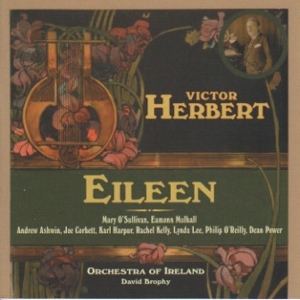Composed in 1916, Eileen remains highly esteemed by connoisseurs of operetta, and for good reason: It’s a delightful work. Victor Herbert used to be possibly America’s most popular composer. Bookended by Gilbert and Sullivan on the one hand, and the rise of the Broadway musical on the other, his posthumous reputation never really stood a chance. He’s long past due for a reappraisal, a job complicated by the horrendous amount of sheer work required to restore his scores to their original form. This last respect is just one way in which this new release is exemplary. You get the full score, plus an appendix of additional numbers, plus the orchestral fantasy on tunes from the opera arranged by Herbert’s assistant Harold Sanford. In other words, this is the complete Eileen, and then some.
The performance is wonderful. As the two lovers, soprano Mary O’Sullivan and tenor Eamon Mulhall lead an exceptionally strong cast. Lynda Lee has an audibly great time as Lady Estabrooke, as does Joe Corbett as Sir Reginald, who gets the big comic number, “If Eve Had Left the Apple on the Bough”. David Brouphy conducts the Orchestra of Ireland in a genuinely vital, colorful reading of this luscious score. Herbert’s aesthetic runs closer to the sentimental Viennese style of Léhar than to the British school of Sullivan, and his scoring reflects that: plentiful harp, colorful percussion, and even a bass clarinet. An Irishman himself, he peppers the score with lightly folk-ish melody in spots, but never to the point of caricature.
Oh yes, and then there’s the plot. Basically, it concerns the love of an Irish rebel (Barry O’Day) for Eileen, niece of Lady Eastabrooke, who holds lands once belonging to the O’Day family. The love interest is set against the backdrop of one of the several late-18th-century Irish rebellions against the British. The bad guy is tax collector Humpy Grogan (the admirably nasty Karl Harpur in an acting role), and there are the occupying forces out to capture Barry and his fellow rebels, who are busy working as smugglers supported by sympathetic villagers. The usual complications and cases of mistaken identity ensue, arriving at a happy ending.
Look, no one listens to this stuff for the thrilling plot; it serves as an excellent framework for some delicious music, splendidly recorded. This is an important and, even better, irresistible release.
































